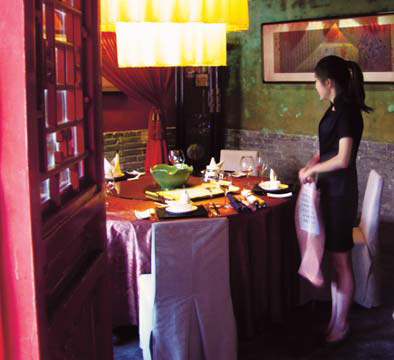Top Stories
Pagoda's 'exclusive' restaurant riles critics
By Qin Zhongwei (China Daily)
Updated: 2011-06-07 08:03
 |
Large Medium Small |
|
Inside one of the private dining rooms at the restaurant in the White Pagoda Temple, which was opened before the Olympics. Provided to China Daily |
Culture chiefs spring to defend ancient temple in media glare
Accusing an ancient temple of running a private club or misusing its buildings for profit now appears to be as easy as shooting fish in a barrel.
The latest to come under the spotlight is Baita Si, or White Pagoda Temple, which was at the center of a media scramble at the weekend after a Beijing newspaper wrote about its "exclusive" restaurant, where each diner is charged about 1,000 yuan a meal.
On Monday, the capital's authorities set out to calm the storm with a press release that confirmed the relic in Xicheng district does have an eatery in "affiliated buildings" that caters to tourists.
The venue is run by the Beijing Jinfengguyun Dinning Corporation, which reportedly has several similar businesses in the capital, and was opened before the 2008 Olympic Games. It has been rated as five-star by the tourism bureau, according to the release from the city's cultural heritage administration.
In a June 4 report by Beijing News, the author claimed the temple is generating massive profits by renting courtyard space to a restaurant that charges diners at least 920 yuan a head. The source for this information was an unnamed staff member.
Calls by METRO to the temple restaurant on Monday went unanswered. However, He Pei, director of the temple's management department, insisted in an interview with Beijing Times that no buildings are being misused.
The temple has an annual expenditure of 700,000 yuan, yet receives less than 100,000 yuan a year in financial support, he told the paper, while the rental deal makes roughly 1 million yuan annually. Most of the surplus money is pumped back into cultural heritage protection projects, he added.
Baita Si dates back to the Yuan Dynasty (1271-1368) and boasts abundant Buddhist treasures, while the white pagoda is the largest of its kind discovered and preserved in China. The media flurry over its use comes just a week after it was reported Wanshou Temple in Haidian district was renting space to a partner design company to sell products.
The management of ancient relics has been a major issue following allegations in the media that the Palace Museum - more commonly known as the Forbidden City - was being used as a private club for the rich and famous.
It prompted a notice from the State Administration of Cultural Heritage on June 1 that called for a full investigation of museums and cultural protection sites nationwide to clampdown on misuse. The probe is expected to be completed on Tuesday.
China Daily
(China Daily 06/07/2011)
| 分享按钮 |
